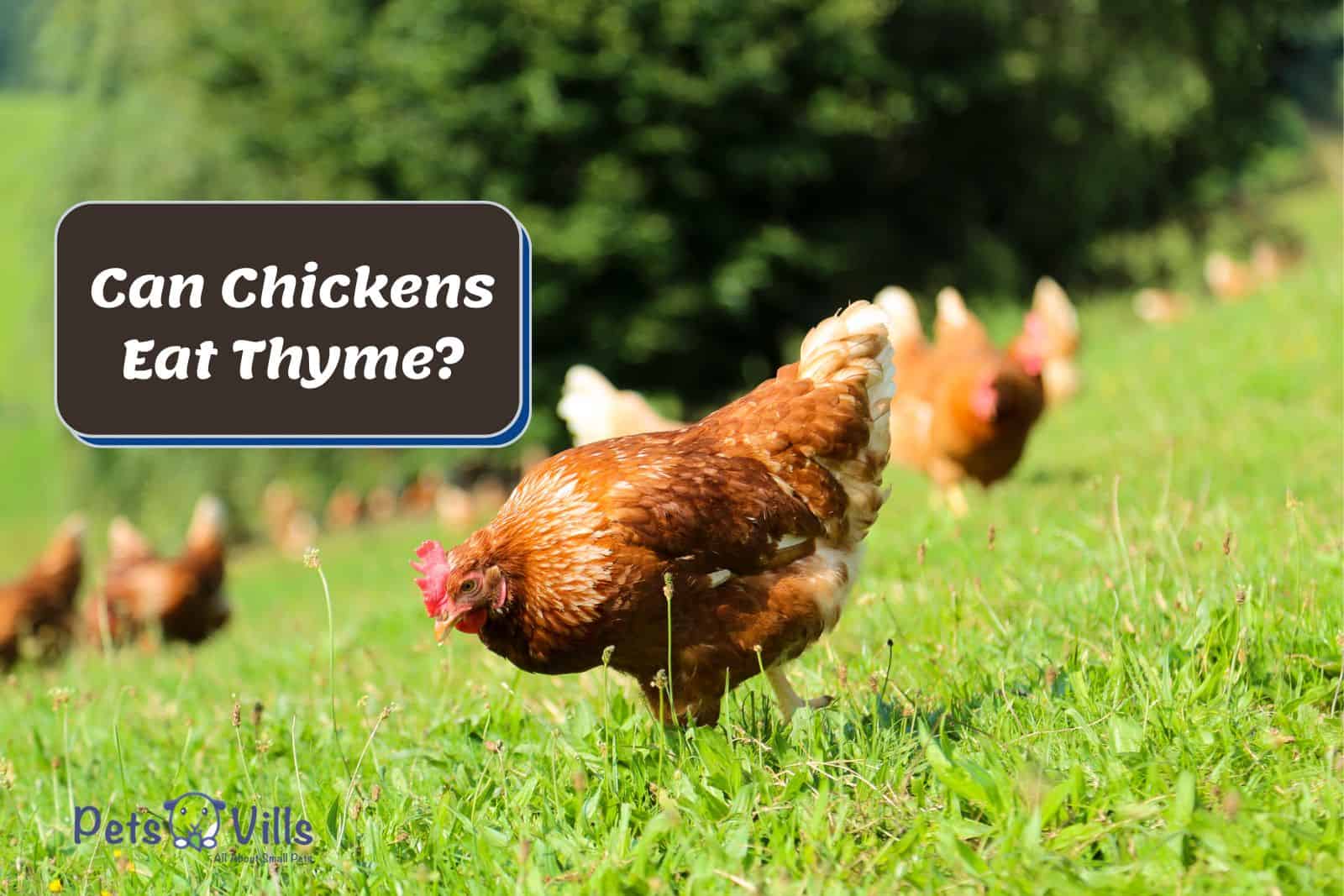Thyme is one of the more versatile herbs. As a result, it doesn’t shock me that many poultry owners wonder whether it’s a suitable food for their chickens.
Can chickens eat thyme? After significant research, I found that chickens can eat thyme. Many experts see it as a beneficial treat option with its high levels of vitamin C, copper, fiber, iron, and manganese (1).
However, the conservation doesn’t stop at whether chickens can eat thyme.
So read on, and learn everything about thyme to see if it’s the right for your chickens!
Table of Contents
Key Takeaways
- Thyme is an excellent, nutritious herb for chickens to eat in moderation. It’ll offer them various vital vitamins and minerals, such as vitamin C and fiber.
- Several health benefits come from chickens eating these aromatic herbs. Some of them include repelling pest infestation and boosting their immune health.
- Thyme can be fed to chickens with three different methods. You can give them fresh thyme, mix it with their feed, or let them eat it from your garden.
Is It Healthy For Chickens To Eat Thyme?
Thyme is less popular than other herbs like parsley, oregano, and basil. However, those who use thyme can benefit from its outstanding nutritional value.
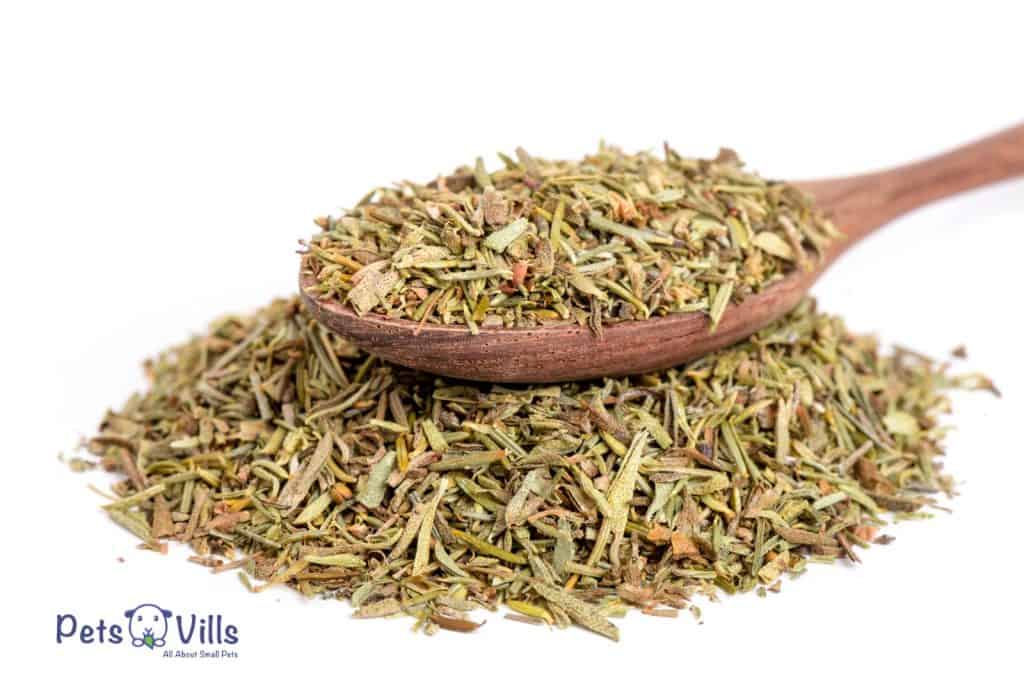
As you can imagine, the same goes for chickens who eat thyme. Here are a few examples of the health benefits they’d gain from eating it to provide some context:
#1 Gets Rid of Pests
One of the more unexpected benefits is its ability to prevent pests from infecting your chickens. It’s a crucial aspect to help stop infestations and other pest-related issues.
It has this potential as an insect repellent because its essential oil components “have insecticidal activity” (2). In other words, they ability to control or repel bugs.
Some notable bugs repelled by thyme include mosquitoes, ticks, and lice from biting them. Basically, all of those nightmarish bugs that nobody wants to deal with or see.
It also helps that repelling them doesn’t take much effort. I simply rub thyme leaves on their skin. It’ll then release the essential oil to ensure these bugs are never an issue.
#2 Boosts Immune System
A chicken’s immune system will significantly benefit from thyme’s vitamin A and C contents. Both are helpful in preventing colds and other respiratory health illnesses.
Similarly, it can help them stop suffering from common chicken ailments by assisting them to recover more quickly. For example, I recently used it to help them fight against the flu.
It ended up improving their body temperature and removing other flu-related symptoms. I was very impressed by how well thyme was able to get my chickens back to tip-top shape.
Can Chickens Eat Thyme Sprigs?
The thyme sprigs are tough and woody, making it hard for the chicken to eat and digest. However, no toxins are found in the stem, making them perfectly fine for chickens to eat.
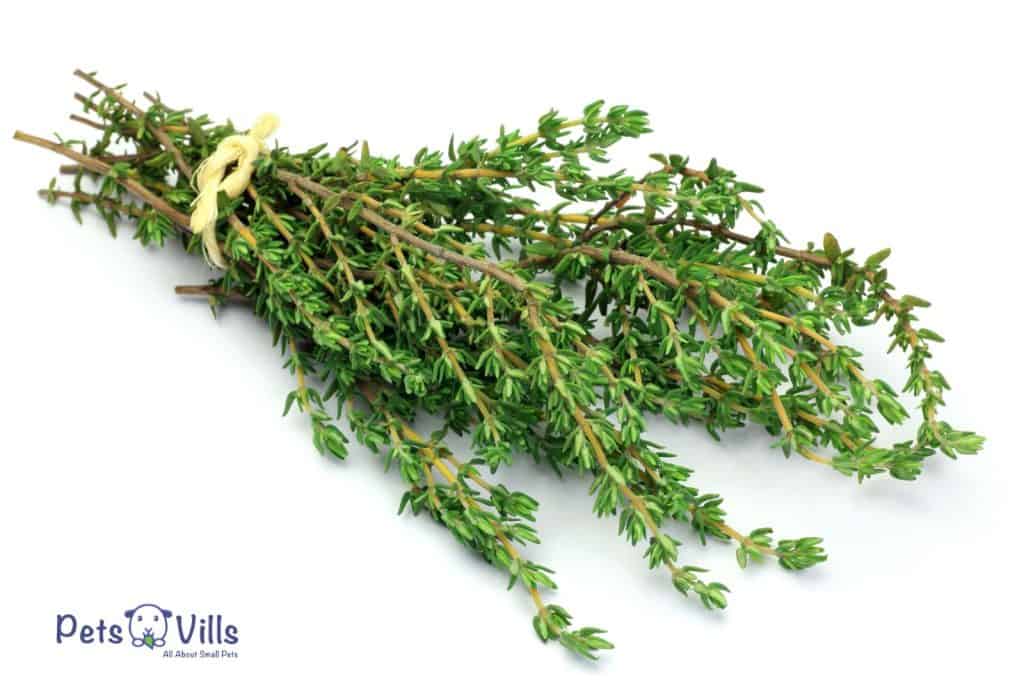
If you want to feed them the sprigs, I’d suggest cutting them into small pieces first. Another option would be to grind the sprigs into bits or pieces.
Lastly, make sure only to feed fresh thyme sprigs to the chickens. As they age, the sprigs will start to dry out and lose all their nutrients while becoming tough like wood.
None of these developments are helpful for your chickens. On the contrary, it’ll make the sprigs much tougher to eat while zapping them of any nutritional value.
Looking to add some variety to your chicken’s diet? Check out our articles on ‘Do Chickens Eat Parsley,’ ‘Oregano for Chickens,’ and ‘Can Chickens Eat Ginger Root‘ to learn more about these tasty treats for your feathered friends.
How To Feed Thyme To Chickens
Chickens will eat anything that you give them. But their lack of pickiness doesn’t mean you don’t need to prepare fresh herbs for chickens like thyme correctly.
You’ll start by washing thyme thoroughly before feeding it to them. It makes sure the thyme is free of any pests and bacteria that may be on the herb.
From there, you can serve the thyme in various ways. Here’s a discussion of three methods to get you started:
#1 Feed Your Chickens Fresh Thyme
Fresh thyme is the most beneficial method of feeding it to chickens. It’s a simple way to keep its overall freshness and high nutritional value.
Furthermore, I’ve found the pieces of the leaves are small enough that you don’t need to cut them. All I need to do is pick away the leaves and toss them into the chicken coops.
My chickens then proceed to devour the thyme. Plus, they get all the nutritional benefits of fresh thyme.
#2 Mixing Thyme With Their Daily Feed
Sometimes, the chickens won’t eat the fresh thyme you toss to them, or you want to boost their nutrition level. For both cases, mixing thyme into their feeds is an excellent idea.
You can mix fresh or dried thyme with their daily feed. Again, I lean more towards using fresh thyme, but it’s a preference issue.
#3 Letting the Chickens Eat Fresh Thyme From Your Garden
As mentioned earlier, fresh thyme is the best for them. So it makes sense that many poultry owners grow this beneficial herb in their gardens.
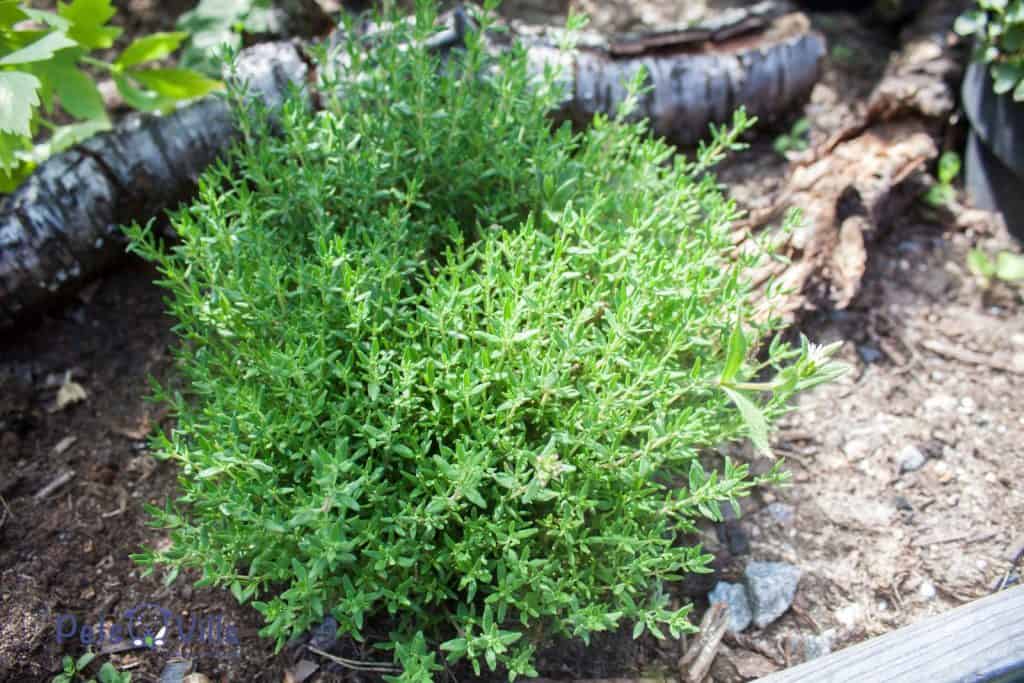
But they do need to grow thyme away from other plants. Otherwise, your chickens will start devouring them along with this culinary herb.
I also should note that chickens will eat every part of the thyme if they are let loose in the garden. It’s one of the main dilemmas I faced when first growing it myself.
My solution was placing a fence or net about half their body height. It was a simple way to ensure they only had access from outside the thyme garden.
How Much And How Often To Feed Thyme To Chickens
Thyme is an herb known for being packed with a lot of nutrition. But I’d still stress moderation when using it.
Most experts agree that thyme and other herbs should only make up 10% of the chicken’s diet (3). The additional 90% needs to come from high-quality commercial feeds.
Commercial feeds are crucial to preserving your chicken’s proper growth rates. For instance, these feeds are constructed to provide the correct amount of nutrition without fail.
As for feeding them, you can toss a handful of thyme on the ground or on their feeder. They will peck at it and eat it without any issues.
Once they’re done eating the thyme, please do not give them anymore. Letting the chickens overeat thyme could cause them to stop eating their feeds.
Instead, it would be best if you only used these potent herbs as a treat: a small amount once or twice per week would be perfect.
Other Herbs That Chickens Can Eat
As you can imagine, there are various usable herbs with chickens. So I thought it’d be helpful to discuss a few others besides thyme:
#1 Parsley
Everyone who’s ever cooked a meal is familiar with parsley. It’s one of the most popular herbs but also relatively healthy.
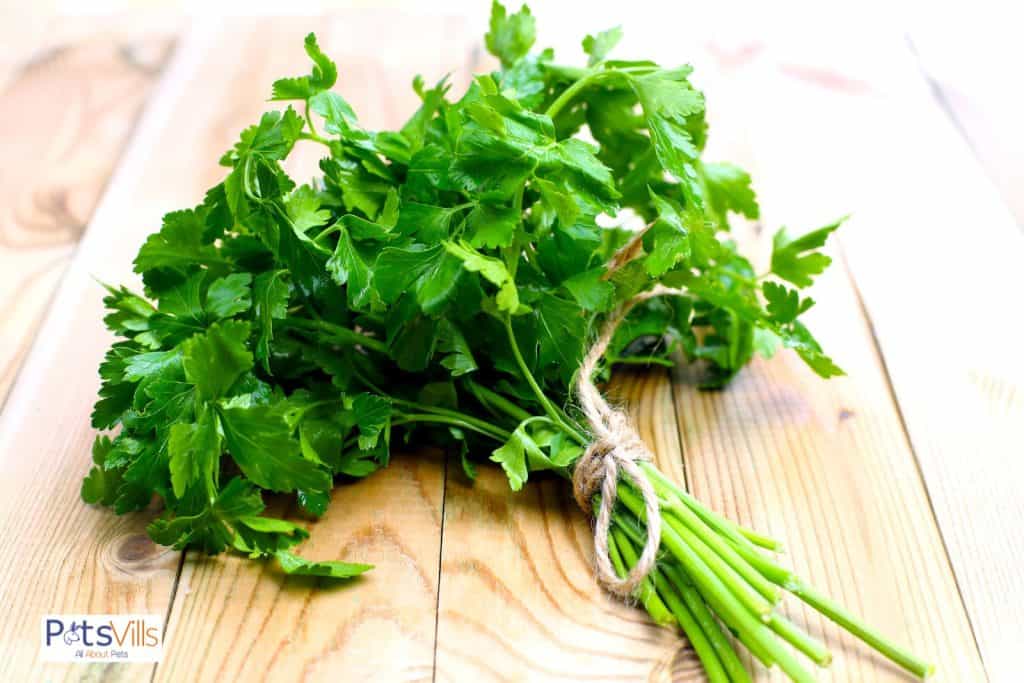
For instance, parsley has multiple highly valued nutrients that benefit chickens. Some include being rich in vitamins A, C, and K.
Meanwhile, it also offers substantial amounts of calcium, iron, magnesium, and potassium. So it ends up being an excellent source of vitamins and minerals.
#2 Oregano
Oregano is an herb rich in antioxidants to help prevent infections and diseases. Due to this, it’s not very shocking many people in the poultry industry love using it.
Its medicinal properties are just one of its valued attributes, too. Oregano is an excellent source of calcium, dietary fiber, vitamin K, manganese, iron, vitamin E, and tryptophan.
Lastly, fresh oregano is a great antibacterial agent. It’ll help chickens stay healthy by killing or preventing bacteria by fighting against bacterial.
FAQs
#1 What herbs can chickens not eat?
Chickens can’t eat a variety of different herbs. But the main culprits include aloe vera, horse nettle, foxglove, henbane, and comfrey.
#2 What herbs do chickens love?

Chickens aren’t known to be stingy with their love of numerous herbs. But in my experience, the favorites are parsley, oregano, cilantro, lemon balm, and thyme.
Conclusion
Can chickens eat thyme? This herb is a perfectly safe option for chickens. But it must be offered as an occasional treat rather than an everyday staple.
If it’s used as a treat, your chickens will benefit from its various health benefits. It may be a massive tool to keep them in good shape for years.
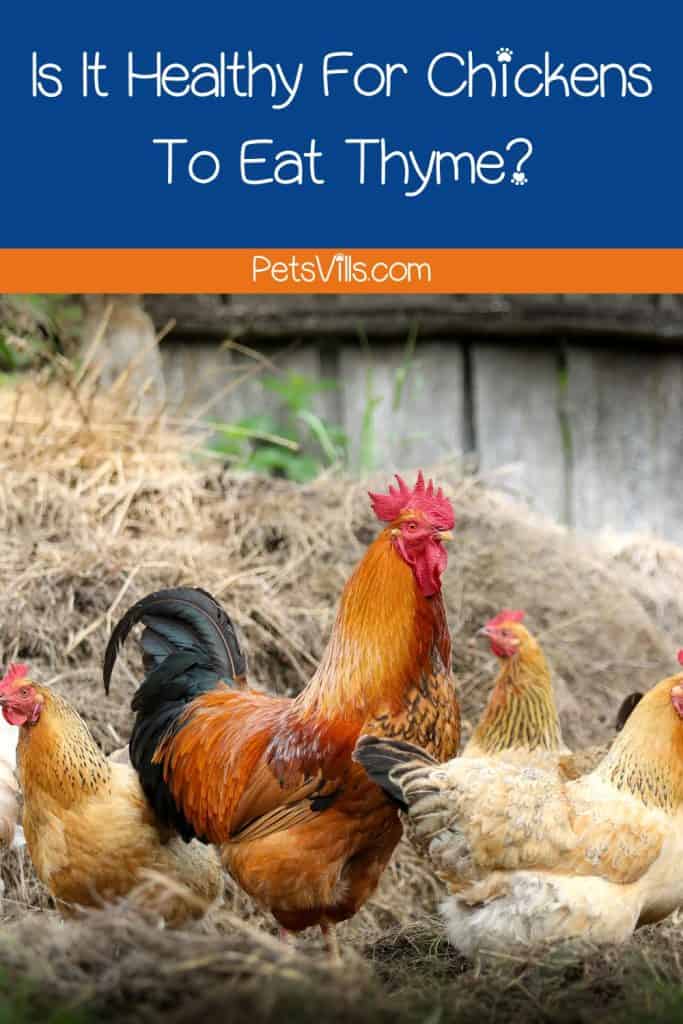
Resources
1. Haselmeyer A, Zentek J, Chizzola R. Effects of thyme as a feed additive in broiler chickens on thymol in gut contents, blood plasma, liver and muscle. Journal of the Science of Food and Agriculture [Internet]. 2015 [cited 2023 Feb 9];95:504–8. Available from: https://pubmed.ncbi.nlm.nih.gov/24862829/
2. Lans C, Turner N. Organic parasite control for poultry and rabbits in British Columbia, Canada. Journal of Ethnobiology and Ethnomedicine. 2011;7:21.
3. Nutrition for the Backyard Flock [Internet]. extension.uga.edu. Available from: https://extension.uga.edu/publications/detail.html?number=C954&title=nutrition-for-the-backyard-flock#title7
Grigorina grew up surrounded by animals – dogs, cats, cows, goats, sheep, and horses and that has shaped her into what I am today – a crazy cat lady who always has a place for one more cat (or a dog). She has two female cats – Kitty and Roni, and two tomcats – Blacky and Shaggy, but she also feeds her neighbors’ cats when they come for a visit. I just can’t say no to them. Follow her on FACEBOOK AND INSTAGRAM
Read her latest articles HERE
Learn more about her

